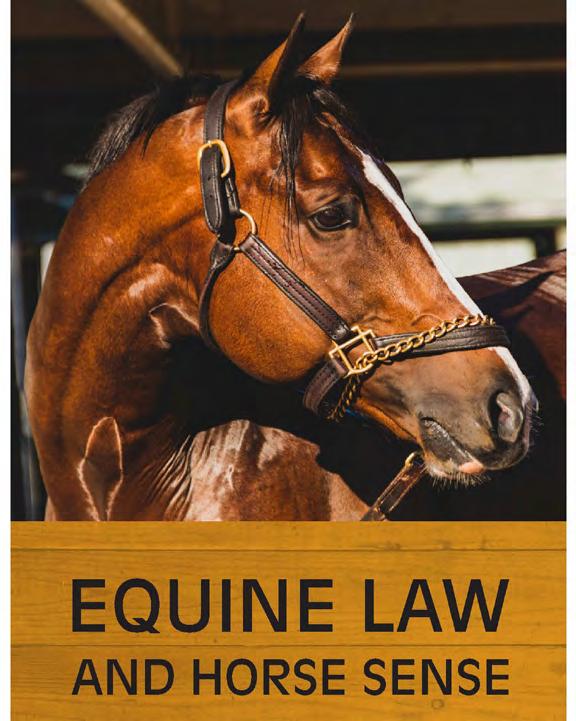
6 minute read
Legal focus
Do Your Equine Contracts Really Protect You?
Equine contracts can be good news or bad news. The good news is that the contracts used in your equine activities – such as waiver/release documents, training contracts, boarding contracts, leases, and sale contracts – can potentially prevent legal disputes from occurring. The bad news is that your contracts might not protect you as well as you expect. Unfortunately, it sometimes takes a legal dispute to discover the shortcomings of your contracts. Careful advance planning, however, can improve your chances of success.
This article discusses some legal disputes people have encountered with their equine industry contracts, with the goal of helping you avoid them.
Waiver/Release Documents
Problems
Years ago, I defended a trail riding stable in a lawsuit brought by an injured customer. Before each ride, the stable required everyone to sign its waiver. The problem was, despite the word “waiver” in the document’s title, the document was not a waiver because it failed to include the most fundamental language where the signer would agree not to sue (lawyers call this “exculpatory language,” and states can differ as to how it should be worded). The stable’s waiver proved to be unenforceable, and we proceeded to a one-week jury trial. Though we ultimately won the trial, the case might not have been brought at all if the stable’s waiver included proper exculpatory language.
Another suit I worked on involved an accident during a riding lesson. A woman fell from a school horse, requiring surgeries and rehabilitation. She sued the stable. The problem was, the release she signed years ago only specified that she was signing in her capacity as parent for her son, the riding student at the time. Nowhere did the document state that she was signing for herself, individually, and releasing the stable.
Solution
If your state enforces waivers/releases of liability (and cases exist in almost every state in which courts have been willing to do so), here are some ideas: • Make sure your waiver/release complies with the applicable state law. The form you found online may not. • Make sure your waiver/release document includes legally valid exculpatory language. • Identify who is signing the document and who the signer has agreed to release from liability.
Boarding Contracts
Problems
I defended a boarding stable in a lawsuit filed against it by a horse owner whose horse was kicked in the pasture by another horse, requiring that the horse be euthanized. The horse owner and the stable disagreed about whether the stable was required to pasture the horse in an individual paddock, away from other horses. The boarding contract was silent on the issue.
In another case, a boarded horse was severely injured when it ran into a tree in the pasture. The horse’s owner threatened suit, but the stable insisted that it was protected by the boarding contract’s liability release clause.
Unfortunately, that clause only applied to people who might be injured, and it said nothing about the stable being released if a boarded horse was injured.
Solution
Here are some general ideas for boarding stables to consider with their contracts:
• Boarding contracts offer stables a great opportunity to describe services they provide in exchange for the boarding fee. For example, the contract can specify number of feedings per day, amount of hay or free-choice hay that horses will receive, and whether daily turnout is provided, whether turnout is in individual paddocks or group pastures. To allow for extra requests from boarders, stables can consider providing a list of optional extra services and a schedule of fees for them. • Horse owners who have special requests can consider writing those requests into the boarding contract, such as a request that the horse receive an individual paddock. • Stables can include within their boarding contracts a liability release pertaining to the boarded horse (where allowed by law and in compliance with state law).
Leases
Problem
A contentious equine lease dispute years ago involved a high-caliber show horse that was qualified to compete in a major championship show. The problem was, that show was scheduled to take place after the lease expired. The lessee (the one who had a right to use the horse through the lease) wanted to extend the lease term to allow that competition. Standing in the way was the fact that the lessor already had a new lease, and the next lessee was waiting for the horse.
One of the most heated disputes that equine leases can generate involves the leased horse sustaining an illness, injury, or lameness during the lease term. Who pays for the horse’s care? When do the lessee’s payments stop? Can the lessee terminate the lease because the horse cannot fulfill its planned use? Can the lessee receive a refund? Without a lease agreement addressing these issues, legal battles can occur.


Solution
Here are some general ideas to consider for equine leases:
• Be careful when you set the lease term.
Some are month to month, which self-renew for an additional month unless sooner terminated by either party. The parties may like this flexibility, which allows the lease to end with 30 days’ advance notice, especially if the horse is a poor match for the lessee. But if the horse’s planned use extends to a particular event, show season, or show, lessees should seriously consider entering into leases for a minimum duration; with negotiation, sometimes leases can provide an option for early termination. • The lease contract can address what happens if the leased horse becomes unsound or unusable for part of the term. Typically, lessees want the lease cancelled when that happens, with refunds. By comparison, lessors may want lessees to pay for the horse’s ongoing care – especially if lessees or their trainers are blamed for causing the problem. With differing interests on the issue
and potentially thousands of dollars at stake, the parties can discuss this issue before they sign the lease. Also, lessees may want to learn about the horse’s health history before the lease agreement is signed. • Leases can also address the lessee’s option to buy the horse, sometimes for a set price with lease payments applied against the purchase price, or rights of first refusal if the lessor wants to sell the horse.
Conclusion
With equine contracts, details are nothing to fear. Contracts cannot prevent all disputes from occurring, but they can potentially narrow the grounds of a dispute. Plan ahead and protect yourself.
This article does not constitute legal advice. When questions arise based on specific situations, direct them to a knowledgeable attorney.
Julie I. Fershtman, Attorney at Law
About the Author
One of the nation’s best-known Equine Law practitioners, Julie Fershtman is a Shareholder with the law firm Foster Swift Collins & Smith, PC, in Michigan. A lawyer with 36 years of experience, she has handled cases in 20 jurisdictions nationwide and has tried equine cases before juries in 4 states. She is listed in The Best Lawyers in America and Super Lawyers. Her speaking engagements span 29 states. Her newest book is “Equine Law & Horse Sense,” published in 2019 by the ABA. Written for non-lawyers and lawyers, this book received 4 national book awards. Find it on Amazon and look for the horse on the cover. For more information, visit www.equinelaw.net.








